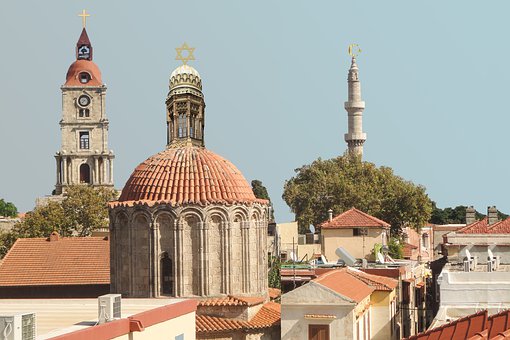We were home, then we were not.
He left home for a place that he would be shown: home.
We were hungry, so we left home, a place of famine, for a flourishing place to the south. Oh, the cucumbers! The onions! The melons, garlic, and leeks! We were at home there for hundreds of years. Eventually, we were enslaved there. Then we were freed. After 210 years, we wandered home.
There, we built a home for You. Then the home was destroyed; we were taken away. Before too long, some of us returned home. We built You another home. That home, too, was destroyed. Once again, many of us scattered. A few remained behind.
Home, away, home, away. That’s our story. That’s always been our story–in our mouths, on a scroll, in a book, on a screen.
“Let Scripture be your Eden,” writes Dunash ben Labrat in the mid-tenth century.
Eden was home for a few dozen sentences, about 39 verses, less than 1% of the Torah’s 5,844 verses. We’ve been trying to get back to the garden ever since. Let Torah be our Eden. If only.
*
My Eden: a minute (a month) in the summer of ‘61 or ‘62. Aunt Cis and Uncle Gene welcomed me at the gate, LAX. This was in the prelapsarian days. Before TSA. From there, the perfect ride: backseat of a Cadillac, Sepulveda Boulevard to Barbydell Drive. Early next morning, Uncle Gene shed his robe, rested his cigar on the pool’s edge, and swam naked a lap or two. In the heat of day, cousins and neighbors splashed, lay down hands on the card table, shmoozed. In the two-car garage, the freezer stocked with Good Humor and Orange Crush was mine. Late in the day, I drifted in my blue plastic boat while, inside, a cook prepared dinner. Otherwise, the house was quiet. The next day, the Magic Kingdom. But for the length of my visit with my beloved maternal aunt, uncle, and cousins, I was King of Cheviot Hills, West L.A. Three thousand miles and lifestyle-years away from home, my suburban family on Drake Road, recently paved, in a split-level house, one of several models from which to choose, in Cherry Hill, New Jersey. A final wave goodbye before boarding the return flight to Philly, a stewardess pinning TWA Junior Pilot wings to my shirt. Eight-years old. That summer in LA: my Eden.
*
And so it came to nothing—all that had been so fine to behold: no chambers of stone, no palace or dwelling; no shambles, no suet, no Temple or offering; no wheels, no immersion, no flesh for transgression; no altar, no wine, no loaves in a row; no blood, no veil, no incense or coal; no smoke, no ashes no splendor, no robes; no priest, no wilderness, no appointment by lot; no scapegoat, no cliff, no country cut off.
Solomon ibn Gabirol (1021/22 – 1057/58), one of the major Hebrew poets of Muslim Spain, clears the ruins of Temple, priesthood, ritual, land. Home: where God dwelled among us.
*
“This year,” writes Yehuda Amichai in “Jerusalem, 1967,” “I dwelled in longing.” It’s an old longing, this longing for Jerusalem, this yearning for our spiritual home.
Yehuda HaLevi, Amichai’s Jewish literary ancestor, famously expressed a similar longing in mid-tenth Century Spain.
My heart is in the East— and I am at the edge of the West. How can I possibly taste what I eat? how could it please me? How can I keep my promise or ever fulfill my vow, When Zion is held by Edom and I am bound by Arabia’s chains? I’d gladly leave behind me all the pleasures of Spain— If only I might see the dust and ruins of your Shrine.
The pleasures of Spain for a Jew at that moment: by the mid-10th Century, Umayyad Cordoba, under the leadership of ‘Abd al-Rahmaan III, had become a sophisticated, thriving, diverse city, rivaling Abbasid Baghdad and Constantinople. “Jews, Muslims, and Christians,” writes Peter Cole, “contributed to its prosperity, and ethnic division between and within these communities was—for a time—held at bay.”
The pleasures of Spain for a Jewish poet at that moment: a rich, Arabic poetic tradition. Drawing deeply on formal and thematic elements found in that tradition, the Hebrew language poets of Muslim Spain, including Gabirol and HaLevi, created some of the greatest Hebrew language poetry, secular and religious, of all time.
Though most of his work is lost, Dunash, the founder of the “new Andalusian Hebrew poetry,” should be considered, writes Cole, as “one of the greatest pioneers” of Hebrew literature.
Dunash again,
Let Scripture be your Eden, and the Arabs’ books your paradise grove.
*
When we arrived in Barcelona, I told my wife we should find a synagogue and go there for Kabbalat Shabbat services (Friday night). We might be invited home for a Sabbath meal with a local Jewish family. Married six months earlier, this trip, our honeymoon, was our first together outside of the United States. At the hotel, we asked several clerks for the name, address, and phone number of a local synagogue. It was 1991, before Google, before smartphones. The first three clerks we asked either didn’t know of any synagogues or didn’t know what a synagogue is.
Earlier in the week, I dragged my wife to Montjuic, specifically to “the great cemetery / behind the fortress of Barcelona” that Philip Levine visits in his poem “Francisco, I’ll Bring You Red Carnations.” Three of Levine’s anarchist heroes, Ferrer Guardia, B. Durruti, and F. Ascaso, are buried there. Montjuic: its Catalonian name meant something like “mountain of the Jews.” That’s all I knew until today, while writing this, when I landed on the homepage for “Montjuic: Treasure Mountain.” There I read that Montjuic was once the home of Barcelona’s Jewish community. We never found the graves, three of hundreds of thousands in that “city of the dead.”
We did, however, find a synagogue, an unmarked building on a residential street where the taxi driver, hesitantly, dropped us off. At the gate we were met by armed security. They asked for our passports. They asked about the purpose of our visit. They asked where we went to Hebrew school. The security team for El Al, Israel’s national airline, asks travelers to Israel similar questions. We hadn’t anticipated such strong security here. We felt at home. Inside, no one welcomed us. No one invited us to sit with them in the sanctuary, let alone to join them for a Sabbath dinner. But we knew our way around the prayerbook, this one in Hebrew and Spanish. We were outsiders, yes, but not regarded suspiciously, merely ignored. Nonetheless, in synagogue on Shabbat, we were home.
We returned to Asheville, N.C. on Jan. 13, 1991. Four days later Operation Desert Storm, our war against Baghdad, began. Throughout our week in Spain, we read the International Herald Tribune, daily reports of protests against the impending war spreading throughout Europe. On Shabbat, the day before our departure, we were anxious to return home from home.
Home: Torah. Home: Temple ruins. Home: synagogue. Home: childhood. Home: a page on the World Wide Web. Home: exile. Home: Jerusalem. Home: history. Home: story, the supreme fiction. What is home? Where is it? When is it? Jewish poets, I turn to you to lead me there.
Richard Chess directed the Center for Jewish Studies at UNC Asheville for 30 years. He helps lead UNC Asheville’s contemplative inquiry initiative. He is a board member for the Center for Contemplative Mind in Society. He’s published four books of poetry, the most recent of which is Love Nailed to the Doorpost. You can find him at http://www.richardchess.com





